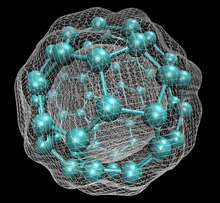
Back كيمياء حاسوبية Arabic Química computacional AST Изчислителна химия Bulgarian পরিগণনামূলক রসায়ন Bengali/Bangla Química computacional Catalan Výpočetní chemie Czech Υπολογιστική χημεία Greek Komputika kemio Esperanto Química computacional Spanish Arvutuskeemia Estonian

Computational chemistry is a branch of chemistry that uses computer simulations to assist in solving chemical problems.[1] It uses methods of theoretical chemistry incorporated into computer programs to calculate the structures and properties of molecules, groups of molecules, and solids.[2] The importance of this subject stems from the fact that, with the exception of some relatively recent findings related to the hydrogen molecular ion (dihydrogen cation), achieving an accurate quantum mechanical depiction of chemical systems analytically, or in a closed form, is not feasible.[3] The complexity inherent in the many-body problem exacerbates the challenge of providing detailed descriptions of quantum mechanical systems.[4] While computational results normally complement information obtained by chemical experiments, it can occasionally predict unobserved chemical phenomena.[5]
- ^ Parrill, Abby L.; Lipkowitz, Kenny B., eds. (2018-10-19). Reviews in Computational Chemistry, Volume 31. Vol. 4 (1 ed.). Wiley. doi:10.1002/series6143. ISBN 978-1-119-51802-0.
- ^ National Research Council (US) Committee on Challenges for the Chemical Sciences in the 21st Century (2003), "Chemical Theory and Computer Modeling: From Computational Chemistry to Process Systems Engineering", Beyond the Molecular Frontier: Challenges for Chemistry and Chemical Engineering, National Academies Press (US), retrieved 2023-12-05
- ^ Korobov, Vladimir I.; Karr, J.-Ph. (2021-09-07). "Rovibrational spin-averaged transitions in the hydrogen molecular ions". Physical Review A. 104 (3): 032806. arXiv:2107.14497. Bibcode:2021PhRvA.104c2806K. doi:10.1103/PhysRevA.104.032806. S2CID 236635049.
- ^ Nozières, Philippe (1997). Theory of interacting Fermi systems. Advanced book classics. Cambridge, Mass: Perseus Publishing. ISBN 978-0-201-32824-0.
- ^ Willems, Henriëtte; De Cesco, Stephane; Svensson, Fredrik (2020-09-24). "Computational Chemistry on a Budget: Supporting Drug Discovery with Limited Resources: Miniperspective". Journal of Medicinal Chemistry. 63 (18): 10158–10169. doi:10.1021/acs.jmedchem.9b02126. ISSN 0022-2623. PMID 32298123. S2CID 215802432.